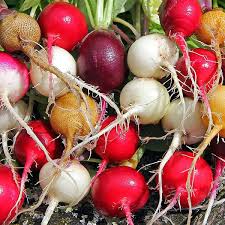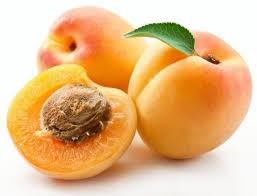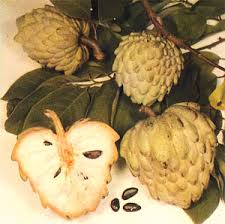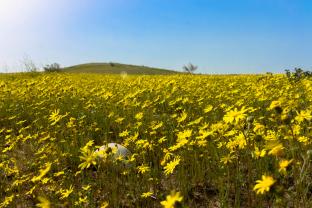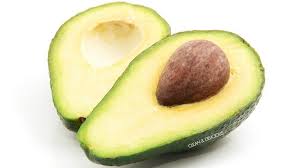This "daikon" is the long white root, which looks like an albino carrot, or alternatively a turnip that has undergone a serious stretching along the length.
If you take a bite (it is crunchy) you discover that it has nothing to do with carrot, and the taste is more like the turnip. Or rather a hybrid between turnip and radish, since the daikon is indeed a radish, according to its botanical definition. Therefore, it belongs to an extensive family, crunchy and very healthy, with many members who are more familiar species and have peels on the red-pink scale (like the regular radish we all know) and less familiar, like the black radish. All parts of the plant are edible – both those growing under the ground, and the leaves that grow over it. We collect the radish leaves (especially the daikon) when they are young, less thorny and more delicate, and offer them under the name "Baby Mustard" or Daikon Leaves. Your soup pot will thank you for such an addition.
"The worm in the radish doesn't think there is anything sweeter." ~ Sholom Aleichem
Organic radish loves sun and humidity. It is planted sometime in late spring, and at the end of autumn the earth is dug a little to see what has grown. In Arabic, the word "Tsunan" is not flattering to this vegetable, since it means "stink," which is probably related to the sharp and piquant taste of the radish. Those who prefer this vegetable a bit more delicate – can peel it (but it's a shame to peel organic radishes and waste so many vitamins…). In our area the radish is an old friend – even in the pyramids of Egypt frescoesof radish were found, and it is recommended as a source of good oil for candles and also as a nourishing food. And actually, why not? According to alternative medicine it is good for treating respiratory problems, preventing stonesin the kidney and gallbladder and encouraging mucus secretion. It contains good amounts of potassium, and therefore promotes urine excretion and prevents the formation of stones where they should not be produced. Our ancestors recommended it for refreshing the sense of taste between dishes: "צנון מחתך מאכל" (AvodahZarah11, 1), and it seems that the Japanese, who grow a lot of radish (especially the daikon – 30% of vegetable crops in Japan! Truly a national vegetable), agree with that proposal, since they serve the local radish, the daikon, with some ginger for the same purpose.
The daikon (big rootin Japanese) is one of the main food ingredients and victuals in the Japanese kitchen, so, if you do not want to be looked at as "what does that gaajin (foreigner, in Japanese) understands," you should not ask a Japanese person "what to do with this daikon", because the Japanese do everything with it: they eat it raw, add to salads, steam it, roast it, pickle it and cook it. They also mix it with cooked eggs, seaweed and fish to get a traditional dish called "Oden", but maybe that is for advanced cooks. The Japanese are not the only ones who like to incorporate daikon in the kitchen – the Thais also like ita lot. If you were offered Hua chai tao tot–you should seize the opportunity to taste these daikon and almond fritters (if you want to try at home, I found a recipe here: https://thai-food-blog.com/archives/6603). The Daikon is also found in Singaporean, Taiwanese and Chinese cuisine, where it appears under the name "White Chinese Radish" (the Japanese call it "real Japanese radish…"), or Lobak, or Lo-Pak. All of these are names for the same daikon.
And before I finish, just three more words – the winter solstice!
We’ve passed it! It was on December 21.
That’s it! From now on, although it is still completely winter outside, the days will begin to lengthen, the nights will shorten, and slowly will begin the rise of light and summer…
For health!
Yours,
Maggie and the garden team
Forecast for this week:
Organic vegetable baskets:
Tomatoes
Cucumber
Tוurnip
Lettuce
Daikon
Parsley
Celery Leaves
Potatoes
Onion
Lemon
Large organic vegetable baskets:
Carrot
Sweet potato
Coriander
Organic fruit baskets:
Oranges
Clementine
Papaya
Bananas
Large Organic fruit baskets:
Pommegrenade
Grapefruit
You can choose off course to mix and match your own order in our website.
If you are around, we are now opened on Sundays, from 1PM.

